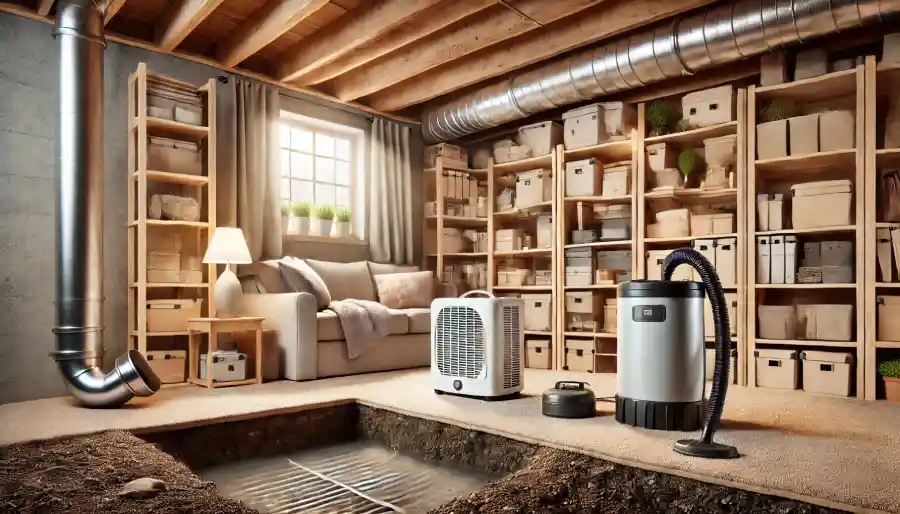Don’t Let Your Basement Get Swamped: Essential Tips for Prevention
Importance of Preventing Basement Water Damage
Basement flooding is a common issue for many homeowners. It can lead to structural damage and mold growth, posing health risks. Preventing basement water damage is crucial for maintaining the integrity of your home. If not addressed promptly, the consequences of basement water damage can be severe, affecting the property’s overall value.
One major reason to focus on basement water damage prevention is the financial burden it can impose. According to experts in basement water damage Denver, flooded basements can cost thousands of dollars in repairs and restoration. Water can weaken the foundation, leading to more significant structural issues. Moreover, health risks associated with mold and mildew can be serious, especially for individuals with allergies or respiratory issues. Mold spores can spread quickly, contaminating the indoor air quality and causing health problems for the occupants.
Common Causes of Basement Water Damage
Understanding the common causes of basement water damage can help take appropriate preventive measures. Some frequent culprits include:
- Heavy rainfall and poor drainage systems: During heavy rains, water can accumulate around the house’s foundation, leading to seepage into the basement if the drainage system isn’t efficient.
- Cracks in foundation walls: Over time, the foundation can develop cracks due to natural settling or other structural issues, which can become entry points for water.
- Faulty plumbing or burst pipes: Plumbing leaks and burst pipes can lead to significant water damage if not detected promptly. Regular inspection of plumbing systems is crucial.
- Sump pump failure: A malfunctioning or overwhelmed sump pump can result in basement flooding, especially during severe weather conditions.
By addressing any foundation crack repair needs early, you can prevent water from seeping into your home. Not only will this safeguard the structure, but it will also mitigate the risks of mold growth, which often accompanies prolonged water exposure.
Preventive Measures
Taking preventive steps can save your basement and home from potential damage. Here are some essential measures:
- Monitoring local weather conditions: Stay informed about weather patterns to anticipate heavy rains and take preemptive measures.
- Regularly inspecting and maintaining gutters and downspouts: Ensure gutters are clean and debris-free to facilitate proper water flow away from the foundation.
- Installing backwater valves and a sump pump: These mechanisms help redirect excess water and prevent it from entering your basement.
Interior Waterproofing Solutions
Interior waterproofing methods include using sealants and dehumidifiers to manage indoor moisture levels. Applying waterproof sealants on basement walls and floors can prevent water seepage through minor cracks. Additionally, interior drainage systems can be installed to divert water away from the basement. These systems typically involve channels or piping installed along the perimeter of the basement floor, leading to a sump pump that discharges the collected water outside. Dehumidifiers, on the other hand, help control the humidity levels inside the basement, reducing the chances of mold and mildew growth.
Exterior Waterproofing Solutions
Exterior methods are essential for a more comprehensive protection strategy. This includes grading the landscape away from your home and installing a drainage system. Proper exterior waterproofing extends the lifespan of your home’s foundation. Exterior wall coatings and membranes can also be applied to prevent water infiltration. These methods require professional installation but provide long-term protection by creating a barrier that prevents water from contacting the foundation walls. Better water diversion and a decrease in hydrostatic pressure against the foundation can also be achieved by installing French drains outside the home.
What to Do in Case of Water Damage
If you encounter water damage, take the following steps immediately:
- Turn off the power supply to avoid electrical hazards: Water and electricity together can be dangerous, so ensure the basement’s electrical connections are switched off.
- Remove valuable items and furniture from the affected area: Moving items to a dry spot can help minimize damage and facilitate drying.
- Contact professional restoration services if the damage is extensive: Experts can assess the situation and provide effective restoration solutions to mitigate further damage.
Regular Maintenance Tips
Regular maintenance is key to preventing basement water damage. Ensure to:
- Check local water tables and groundwater levels periodically: Monitoring these indicators can give you insights into potential water issues in your area.
- Inspect your foundation for cracks and repairs immediately: Addressing even minor cracks can prevent them from becoming major entry points for water.
- Keep gutters clean to prevent overflow and direct water away from the home: Regular gutter cleaning ensures an efficient drainage system and prevents water accumulation near the foundation.
When to Seek Professional Help
Sometimes, despite all preventive efforts, professional intervention may be necessary. If you notice persistent water problems or significant structural damage, it’s vital to consult with experts who can offer specialized solutions. Seeking professional help can ensure thorough inspection and more permanent solutions To prevent these issues, many homeowners opt for interior and exterior waterproofing solutions, which provide comprehensive protection against water infiltration. Professionals can also recommend and install advanced waterproofing systems, conduct detailed assessments, and provide tailored solutions based on your home’s needs.

